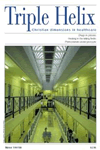This short text is based on a lecture given to the Institute of Health Policy Studies at Southampton University in 1996 with the addition of an introduction and afterword. Overall I found the book very disappointing since I expected a much deeper and less biased examination of the ethical issues relating to euthanasia and the care of patients.
I tend to agree with the discussion of the ways in which doctors see patients, and how medical training and career progression may make it harder for the patient to be seen as a person. Also, we do need to provide adequate information for patients so they can make a decision regarding their treatment and refuse it if they so desire. However, the majority of the text is a circuitous and fragmented philosophical argument relating to personal autonomy, and is widely referenced from other works, since the author recognizes that his original training was as a historian.
Although issues of autonomy and personal choice clearly relate to the title, and have to be included in such a discussion, I found the presentation very one sided with opposing views mentioned only very superficially (if at all) and then dismissed without further comment. The author suggests there is a greater need for more palliative care, but leaves an uncertain impression of its significance since the only mention of it is in the introduction. The overwhelming emphasis is placed on 'self' and 'rights' under the politically correct term 'autonomy', with no place for 'relationship' and 'community', be they Christian or otherwise. To quote the author, is the only basis of our relationship with others 'That we should not merely live passively with a stranger'?
There seems no medical input into the text, which means that it offers very little help in tackling the difficult ethical questions around the issues of life and death. In addition there are gross inaccuracies which display a singular lack of understanding, and/or disdain for the opinions of others. There are no references to, and therefore no discussion of, the Report of the House of Lords' Select Committee on Medical Ethics, although it is listed as other source material.
This Report clearly stated that the phrase 'passive euthanasia' should no longer be used and preferred 'treatment limiting decisions' in order to recognise that intention is of major importance and that 'double effect' should not be interpreted as euthanasia. The author has not only ignored this advice, but has also incorrectly used the terms 'involuntary' and 'non-voluntary euthanasia', leaving the reader uncertain as to his meaning.
He also discusses brain death, coma and persistent vegetative state as being synonymous and argues that death needs to be redefined. The impression he gives is that the majority of doctors still hold the view that 'everything possible should be done to maintain life'. Surely most recognize that there is a dying process and it should not be prolonged unnecessarily by instituting treatment without hope of cure for the patient? Therefore, the medical definition of death is sufficient.
Perhaps the book has the wrong subtitle and it should read 'making personal choices in health care'? Morals are personal but they have to be set out in an ethical manner to provide the basis of life for society as a whole. There are aspects of this work, which is from a health policy advisor and the Chairman of The Patients' Association, which make me fear for the future of medicine within our health service.
Reviewed by
John Peacock
(Senior Lecturer and Consultant Anaesthetist, Royal Hallamshire Hospital, Sheffield)































